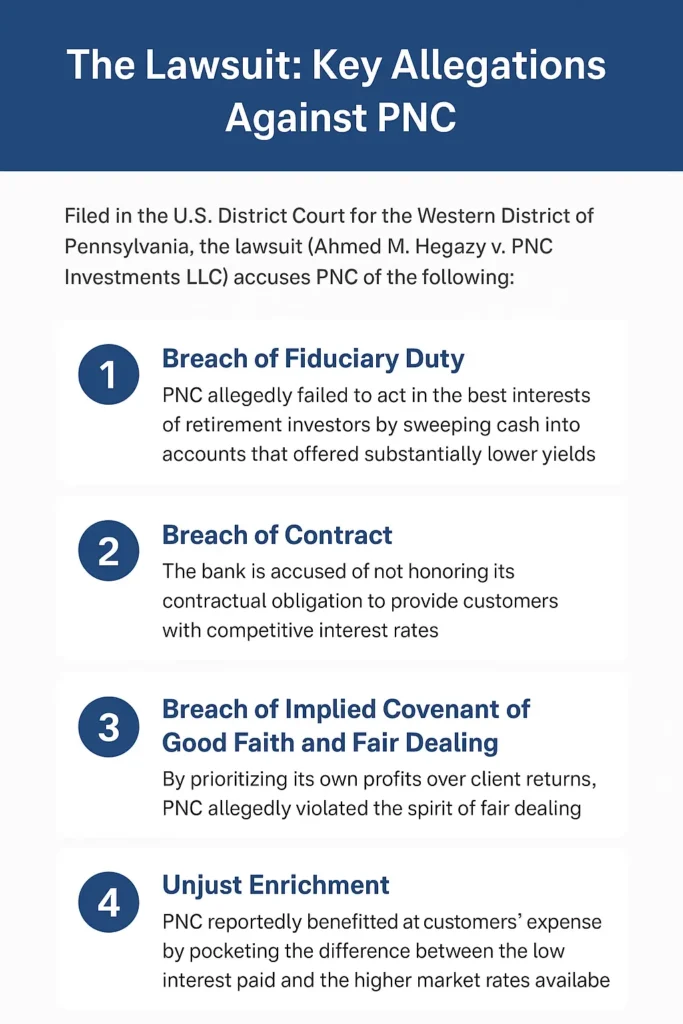Introduction
If you hold a PNC retirement or brokerage account, you may be affected by an ongoing PNC retirement account cash sweep lawsuit news against PNC Financial Services Group and its subsidiary, PNC Investments. The case, filed in December 2024, alleges that PNC’s retirement account cash sweep program unfairly diverted customer funds into low-interest accounts—causing significant financial losses to investors.
In this blog, we’ll break down the lawsuit, the allegations against PNC, what it means for retirement savers, and the steps you can take if you’ve been impacted.
What Is the PNC Cash Sweep Program?
A cash sweep program is a common feature in brokerage and retirement accounts. When investors have uninvested cash balances, banks automatically “sweep” that money into an interest-bearing account—usually a money market fund or bank deposit program.
On the surface, this sounds beneficial. But here’s the issue: PNC allegedly swept idle cash into affiliated bank accounts that paid very low interest rates—much lower than what was available in the market. You can read more on PNC cash sweep lawsuit investor warning for detailed insights.
Competitors like Fidelity, Vanguard, Robinhood, and R.W. Baird offered yields up to 4.15% APY during the same period.
PNC, however, allegedly paid well below market rates, retaining the difference as profit. For more updates on these claims, see PNC investments cash sweep accounts lawsuit updates.
The Lawsuit: Key Allegations Against PNC

Filed in the U.S. District Court for the Western District of Pennsylvania, the lawsuit (Ahmed M. Hegazy v. PNC Investments LLC) accuses PNC of the following:
1. Breach of Fiduciary Duty
PNC allegedly failed to act in the best interests of retirement investors by sweeping cash into accounts that offered substantially lower yields.
2. Breach of Contract
The bank is accused of not honoring its contractual obligation to provide customers with competitive interest rates.
3. Breach of Implied Covenant of Good Faith and Fair Dealing
By prioritizing its own profits over client returns, PNC allegedly violated the spirit of fair dealing.
4. Unjust Enrichment
PNC reportedly benefitted at customers’ expense by pocketing the difference between the low interest paid and the higher market rates available.
Why This Matters for Retirement Savers
At first glance, the difference between 0.5% APY vs. 4% APY may not seem massive—but compounded over time, it can cost retirement investors thousands of dollars.
For example:
- A $50,000 retirement balance swept at 0.5% APY earns just $250 in a year.
- At 4% APY, the same amount could earn $2,000 annually.
- Over 10 years, this gap can grow to tens of thousands of dollars.
This is why many retirement savers are closely following the PNC retirement account cash sweep lawsuit—the financial implications are substantial.
Who May Be Affected?
You may be impacted if you:
- Held uninvested cash in a PNC-managed retirement or brokerage account.
- Noticed below-market interest rates on your account statements.
- Were enrolled in the PNC Priority Bank Deposit Sweep Program.
What You Can Do If You’re Impacted
If you think you’ve been affected by PNC’s sweep program, here are the next steps:
- Review Your Account Statements
- Look at past APYs (annual percentage yields) on uninvested cash.
- Compare with competitors’ advertised rates during the same period.
- Check for Class Action Updates
- Stay informed on whether the court certifies a class. Class members may receive direct notices in the future. Learn more on PNC investments cash sweep accounts lawsuit updates.
- Consult Legal Resources
- Law firms such as Sauder Schelkopf are already investigating claims.
- You can also track updates on class action news portals like TopClassActions.com.
- Monitor Financial Losses
- Calculate potential interest lost over time.
- This may help you determine eligibility for compensation.
Broader Industry Context
PNC is not alone. Similar lawsuits and investigations have targeted other major financial institutions:
- Schwab faced scrutiny for its cash sweep programs.
- Morgan Stanley and other brokerages have been accused of placing client cash in affiliated banks to maximize profits.
This reflects a growing legal trend: regulators and courts are taking a closer look at whether financial firms are truly acting in their clients’ best interests.
Experience Matters: Law Firms Taking Action
The lawsuit is currently being spearheaded by law firms with extensive class action experience. For instance, Sauder Schelkopf has recovered over $1 billion on behalf of clients nationwide.
Their recognition includes:
- Legal Intelligencer’s 2022 Professional Excellence Awards
- LawDragon 500 Leading Plaintiff Consumer Lawyers list
- Named among Top 100 Trial Lawyers in Pennsylvania
These credentials highlight that the case is being taken seriously by experienced litigators.
Conclusion: Stay Informed and Protect Your Retirement
The PNC retirement account cash sweep lawsuit could have major implications for retirement investors across the U.S. If the allegations are proven, thousands of account holders may be entitled to financial compensation.
👉 Key Takeaway: Always monitor your account statements, compare interest rates with market benchmarks, and stay updated on class action news.
For readers interested in the latest financial and legal trends, keep following TechBizPinnacle.com—your trusted source for industry insights and updates.
FAQs (SEO Booster)
Q1: What is the PNC retirement account cash sweep lawsuit about?
It alleges PNC swept idle retirement cash into low-interest accounts, shortchanging investors.
Q2: Who can join the lawsuit?
Customers with PNC retirement or brokerage accounts subject to the sweep program.
Q3: How much money could I have lost?
Depending on account balance and time period, losses could range from hundreds to thousands of dollars.
Q4: What should I do now?
Review your account, stay updated on class certification, and consult a legal professional if needed.